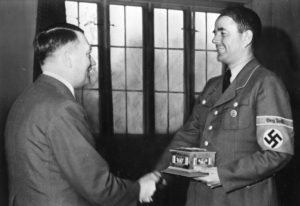Most of his friends had been hanged. But despite his central role in helping to construct Adolf Hitler’s Nazi nightmare, Albert Speer somehow managed to receive from the Nuremberg trials only a 20-year sentence at the Spandau Prison in Berlin. Not long after arriving in Spandau, Speer met with the prison chaplain. To the chaplain’s shock, Speer said, “I want to use my time in prison well. So what I want to ask you is: Would you help me become a different man?”
The chaplain was savvy enough to know that for Speer to have even a chance of becoming different, he would have to provide full disclosure of his past evils. Whether or not Speer succeeded in doing that is a matter of considerable debate among those who have studied Speer’s writings. Speer’s memoir Inside the Third Reich was praised for its candor when it was first published. But over time people began to see that in actuality Speer may have held back, failing to confess the full scope of his Nazi activities. In fact, Speer probably made use of that age-old trick whereby you acknowledge some truths as a way to distract people from noticing other things you’d rather not talk about.

He talked to avoid speaking.
He laid just enough on the table to keep people from noticing what he was hiding under the table. Alas, it is possible Speer himself was not aware he was doing this. At very least, however, Speer and his spiritual counselors knew that the key ingredient in becoming a different person is forthright confession. Psalm 32 agrees.
Psalm 32 is a powerful poem for three voices as it teaches that the path to beatitude is confession. In a scarred world of sin, we are as often the perpetrators of wrong as we are victims of it. Fight though we may to combat sin, the unhappy fact is that whether you are nine-years-old or ninety, confessing sin is like taking out the garbage: once is not enough–in fact, you need to keep up with the task daily so the house doesn’t start to stink!
True, some days we may have only the spiritual equivalent of a crumpled cereal box and a banana peel to carry out. But there are also those days when the trash has to go out because a chicken carcass and some bacon grease are deliquescing at the bottom of the kitchen trash can. But whether it’s some small lapse or a stunning misdeed, the truly honest among us admit that the core truth of Psalm 32 touches us every day.
Again, the very structure of the psalm makes this clear. Psalm 32 appears to have been written for use in worship. The opening and closing pairs of verses (the second set of which is technically not included in this Lectionary selection) are the “lines” spoken by the priest. The priest begins by claiming that the path to beatitude, the way to be really blessed in life, is to be a person who knows he or she is forgiven by God. Following verse 2 you can almost hear the priest say, “For instance . . .” and then he would point to the person who speaks verses 3-7. This second voice in the psalm then becomes like a living example to substantiate the claim of the opening beatitude. The priest claims in verse 1, “Blessed is the one who knows her sins are forgiven.”
Then just such a person chimes in and says in verse 3, “That’s true! Look at me! When I kept quiet about what I had done, I was miserable. Day and night I was tormented by the thought that there was something out of alignment between the Master of the universe and me. Finally I couldn’t take it anymore and so I spilled the beans. And, Voila!, God took away my guilt by forgiving me in something quicker than the blink of an eye!”
Following these wonderful words, the voice of God then bursts onto the scene in verses 8 and 9 (again, just after the RCL would have us quit, so maybe we should preach on the whole psalm), confirming what the penitent person had just said. Things are so correct now between this sinner and God that God can speak tenderly and directly. God is not aloof, sitting off in a corner with his arms crossed over his chest and a stern look in his eye. No, God is tenderly, personally present, offering further instruction so that from here on out maybe life will go a bit better for this person.
Finally, in the last two verses the voice of the priest returns. With a smile on his face, he proclaims that his opening beatitude has now been proven. “Yahweh’s unfailing love, his chesed, his grace, surrounds us. We’re hemmed in by God’s good heart. God’s got us surrounded! There’s no escaping his mercy! And so rejoice! Sing! Be glad! We’ve got a God who makes forgiving us the #1 item on his list of things to do every day.”
Psalm 32 reveals a biblical irony: as grim, dark, and awful as sin is, dealing with this same sin leads to joy! Sin may be the “bad news” of life, it may be every bit the “downer” and “guilt-inducer” that all those trendy preachers who avoid ever talking about sin claim it is. But Psalm 32 is one of a legion of biblical texts which reminds us that the path to lilting joy leads right through sin. Indeed, some of the most effusive passages in the Bible are the ones that talk the most about sin. Because when you’ve got a God who drips with grace like our God does, the bottom line is never just about sin but about how swiftly God forgives sin!
Probably not a few of us could tell a similar story from our own experience. But it is equally probable that many of us could tell an opposite story, either about ourselves or about someone else. If Psalm 32 were a description of how things always go, our world and our lives in it could be significantly better. If it were true that every time we sinned we not only knew it but were plagued by it until we came clean and confessed it, if that’s how things always were, then we might very well find ourselves leading happier lives.
If everyone always confessed their sins to God and to each other, then we maybe would be done with bearing grudges. We would maybe be done with seeing people “get away” with something. It always drives us a little crazy to watch someone hurt another person only to trot away without even the slightest twinge of regret. But if Psalm 32’s description were always accurate, that wouldn’t happen. The person who hurt you would admit it and ask you to forgive him. Also, when it is you who did the wounding, you also would be led to beg for forgiveness. As a result, our mutual life together might go along much better.
Alas, however, Psalm 32 is not a description of how things always go. All of us routinely commit sins that as a matter of fact do not burn our innards like hot wax, that do not cause us to toss and turn on our beds all night long, that do not sap our strength. No, instead we often go on with our lives just fine. Sometimes we even flourish.
And if that’s true even within the community of the church, we know full well that it happens with abandon in the wider world. Lots of people have whole aircraft carrier’s worth of sins which they never acknowledge to God or anyone else. But far from being weighed down, these folks proceed forward in life with a spring in their step, smiling all the way to the bank as shady business deals pay off, tax evasions succeed, extramarital affairs go undiscovered. They not only fail to confess their sins, they fail even to notice them!
Again, that’s not just the case with mafia dons, corrupt corporate CEOs, or playboys. Something similar can happen even to us. More days than not our confessions of sin get no more specific than the generic, “Forgive me for all my many sins, Amen.” Granted, saying even that is better than never confessing at all, but how probing or finally helpful is such anonymous acknowledgment of sin? Do such generic confessions help us feel and so celebrate the wonder of grace? Do empty confessions help us clean up those parts of our acts that are less-than-lovely many days?
We can’t change the past, we often say. That’s a painful truth. How much don’t at least some of us yearn that we could go back and turn left instead of right. We can’t. If, as science fiction movies like to show, if we could travel through time, I suspect the world would end. If time travel were possible, I suspect that most every person in the world would take advantage of it by zipping back to one past moment after the next to change something, to prevent something, to make something better. Eventually there would be so many changes going on in the past that there would be no stable present moment in which to live.
No, we can’t change the past. But God can. Through the alchemy of grace God can take what hurts us and make it better, take what weighs us down and blow it away like a feather. And when God does that–and when does God not?!–the present moment is transformed. Our happiness increases, our love for God mounts higher, our wonder at God’s grace brings an irrepressible smile, and the future looks effervescent with joy.
Illustration Idea
Psychologists tell us that there is such a thing as “doubling.” On a grand scale this is sometimes accomplished by those who have committed truly heinous crimes. Some of the soldiers responsible for the My Lai massacre in Vietnam thirty years ago viciously put bullets through the brains of women and children and bayoneted suckling infants. How could they live with themselves following such horrors? Well, they doubled themselves. “It wasn’t I who did that but someone else, some nameless “other” person inside my skin. That didn’t come from the core of who I am–it couldn’t have!” Ask some of those soldiers who pulled all those triggers, and they will reply, “I don’t know.”

That is a dramatic example of something we all do to one degree or another. We keep trying to daylight between ourselves and ourselves. In some of the Godfather movies mobsters who had assassinated one another’s sons nevertheless find it possible to be in the same room together, backhanding away those other events as being “just business.” “Sure I had your son killed, but it was just business, right?”
Sometimes we put a similar move on ourselves. Decisions we make at the office on Thursday don’t follow us into the sanctuary come Sunday morning. Or, we manage to slip out of the noose of our own actions by claiming afterwards, “I was misunderstood. My intentions were good! I’m not really an angry person, I just lose my temper sometimes . . . a lot of times . . . OK every day, but I don’t have an anger problem! I love people!”
The Psalm 32 path to beatitude does not go down these roads of denial.
Sign Up for Our Newsletter!
Insights on preaching and sermon ideas, straight to your inbox. Delivered Weekly!
Sermon Commentary for Sunday, November 3, 2019
Psalm 32:1-7 Commentary